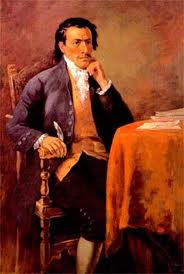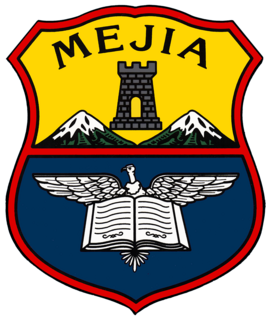Related Research Articles

Francisco Javier Eugenio de Santa Cruz y Espejo was a medical pioneer, writer and lawyer of mestizo origin in colonial Ecuador. Although he was a notable scientist and writer, he stands out as a polemicist who inspired the separatist movement in Quito. He is regarded as one of the most important figures in colonial Ecuador. He was Quito's first journalist and hygienist.
Manuel Benjamín Carrión Mora was an Ecuadorian writer, diplomat and cultural promoter.

Alfredo Pareja Diezcanseco — born Alfredo Pareja y Díez Canseco — was a prominent Ecuadorian novelist, essayist, journalist, historian and diplomat. An innovator of the 20th-century Latin American novel, he was a founding member of the literary Grupo de Guayaquil, which brought a new emphasis to realistic novels.
Theo Constanté Parra was a master Latin American painter part of the Abstract Informalist Movement in Ecuador. In 2005, Constanté won the country's most prestigious award for art, literature and culture, the Premio Eugenio Espejo National Award, presented by the President of Ecuador. Constanté's works are abstract in nature and consist of many colors which meld together amongst loosely drawn geometric lines. Constanté stated that his favorite colors were red, orange and blue and they are the colors that are typically more dominant in his work.
Aníbal Villacís was a master painter from Ecuador who used raw earthen materials such as clay and natural pigments to paint on walls and doors throughout his city when he could not afford expensive artist materials. As a teenager, Villacís taught himself drawing and composition by studying and recreating the illustrated ad posters for bullfights in Quito. In 1952, Jose Maria Velasco Ibarra, former President of Ecuador, discovered Villacís and offered him a scholarship to study in Paris.

Eugenia Maria del Pino Veintimilla is a developmental biologist at the Pontificia Universidad Catolica del Ecuador (Pontifical Catholic University of Ecuador) in Quito. She was the first Ecuadorian citizen to be elected to the United States National Academy of Sciences (2006). She was awarded the 2019 Prize of the Latin American Society for Developmental Biology for her strong contributions to research in Ecuador, and in general to promoting Developmental Biology in Latin America.

Instituto Nacional Mejía is a public secondary educational institution of Quito. It was founded on June 1, 1897 by Eloy Alfaro Delgado, then president of Ecuador.

Abdón Ubidia (1944) is an Ecuadorian writer who is considered one of the most representative and relevant voices of modern Ecuadorian literature. He was the 2012 recipient of the Premio Eugenio Espejo in Literature, awarded to him by President Rafael Correa.
Rodolfo Pérez Pimentel is an Ecuadorian lawyer, historian, and biographer. He was declared the lifetime chronicler of the city of Guayaquil, and is a member of the National Academy of Ecuadorian History. He was the 2005 recipient of the Premio Eugenio Espejo in Literature, awarded to him by President Alfredo Palacio.
Euler Granda was an Ecuadorian poet, writer, and psychiatrist.

Plutarco Naranjo Vargas was a doctor, teacher, journalist, historian, and scientific researcher. He served as the Ecuadorian ambassador to the Soviet Union, Poland, and the German Democratic Republic (concurrently) from 1977 to 1978. In 1988, he accepted a four-year appointment to the cabinet of newly elected president Rodrigo Borja Cevallos as Minister of Health.
Esperanza Cruz Hidalgo is a former Ecuadorian ballerina and dance instructor.
José Amén-Palma is an Ecuadorian surgeon and medical researcher.

Jorge Núñez Sánchez was an Ecuadorian writer, historian, and professor.
Diego Luzuriaga is an Ecuadorian composer of classical music.

Alfonso Rumazo González was an Ecuadorian writer, historian, essayist and literary critic.

Veronica Bonilla is a children's writer, illustrator, and graphic designer from Ecuador. She was born on 11 June 1962 in Quito D.M. and has published children's literature since 2012. She has 71 international book registers ISBN in several formats, in paper as well as in digital format. She publishes in both Spanish and English, and she also has produced audiobooks.
Luz Argentina Chiriboga is an Afro-Ecuadorian writer who was one of the first writers to address the duality African and Hispanic cultures. In her poetry and novels, she writes about women in ways that challenge preconceived stereotypes. Her short story "El Cristo de la mirada baja" won first prize in 1986 in the International Literary Contest of the Liberator General San Martín held in Buenos Aires.
Juan Valdano Morejón is an Ecuadorian writer. He was born in Cuenca in 1939. He studied at the University of Cuenca, Complutense University of Madrid and the University of Aix-en-Provence. He taught literature and literary theory at the University of Cuenca and at the Pontificia Universidad Católica del Ecuador.
Marcelo Cruz Utreras is an Ecuadorian neurologist and politician.
References
- 1 2 "Casa de la Cultura Ecuatoriana » KATIA SUSANA ROMOLEROUX OBTIENE PREMIO NACIONAL EUGENIO ESPEJO" . Retrieved 2021-04-28.
- 1 2 "Katya Susana Romoleroux – Ministerio de Cultura y Patrimonio". www.culturaypatrimonio.gob.ec. Retrieved 2021-04-28.
- ↑ IPNI. Romol.